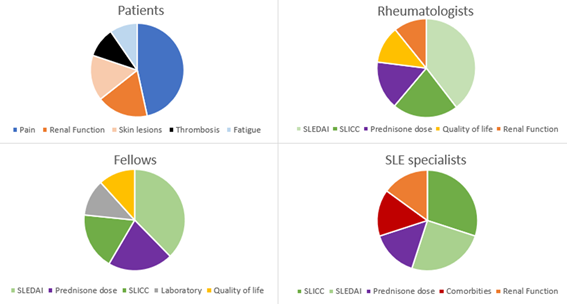Session Information
Date: Tuesday, October 23, 2018
Title: Patient Outcomes, Preferences, and Attitudes Poster II: Patient Perspectives
Session Type: ACR Poster Session C
Session Time: 9:00AM-11:00AM
Background/Purpose: Now-a-days there is a growing trend of switching to a more patient-centered healthcare system, with a widespread use of patient-reported outcomes (PROs). However, most of PROs questionnaires are designed by physicians/specialists and patients are underrepresented in this development. This research’s purpose was to identify and compare major outcomes that matter for patients and rheumatologist aiming to better address patient´s needs. Methods: 75 consecutive SLE patients (SLICC criteria, 2012) and 53 Rheumatologists from a tertiary center were invited to answer an open questionnaire inquiring their 5 major concerns regarding lupus outcomes. Among the 53 Rheumatologists there were 5 SLE specialists and 20 rheumatology fellows. The top 5 concerns of each group were assessed and frequencies where compared with appropriate tests. The agreement rate was calculated considering the sum of lowest frequency of each concern that appeared in all the analyzed groups. Results: The top 5 concerns raised by patients were: pain (47%), renal function (18%), skin lesions (16%), thrombosis (10%) and fatigue (10%). The top 5 concerns among rheumatologists were: SLEDAI (40%), SLICC-Damage Index (SDI) (22%), prednisone dose (16%), quality of life (12%) and renal function (11%). The agreement rate between all rheumatologists was 63% (all agreed that SLEDAI, SDI and prednisone dose were major concerns). Fellows pointed laboratory tests (such as anti-DNA and Complement levels) as a major concern not reported by the other rheumatologists (p=0.002). SLE specialists pointed comorbidities (such as hypertension and obesity) as main concerns not reported by the other rheumatologists (p=0.032). The agreement rate between patients and rheumatologists was 45% (renal function, skin lesions and thrombosis). The main difference between patients and rheumatologists were the pain (p=0.0001) and fatigue (p=0.023). Fatigue was reported as an outcome concern by 10% of the patients but less than 2% of rheumatologists, however quality of life pointed by rheumatologists may address partially the fatigue concept. Regarding pain, half was related to generalized pain and the other half related solely to arthralgia and therefore the majority would not be scored by SLEDAI (that consider only arthritis as a domains). Conclusion: We identified that there are different outcome concerns between patients and rheumatologists for lupus treatment. Pain was the most important discrepancy since it is not adequately addressed by the routine SLE indexes reported as the top 5 Rheumatologists outcome concerns. Improving physician’s awareness of patient’s outcome concerns and of comorbidities, as pointed out by the specialist, may provide a better assistance and ensure treatment adherence in this disease.
Figure 1. Top 5 major outcome concerns among SLE patients and Rheumatologists

To cite this abstract in AMA style:
Bertoglio I, Abrahão G, Bonfa E, Lopes M. Systemic Lupus Erythematous Outcome Concerns: Identifying Pain As the Major Discrepancy between Rheumatologists and Patients [abstract]. Arthritis Rheumatol. 2018; 70 (suppl 9). https://acrabstracts.org/abstract/systemic-lupus-erythematous-outcome-concerns-identifying-pain-as-the-major-discrepancy-between-rheumatologists-and-patients/. Accessed .« Back to 2018 ACR/ARHP Annual Meeting
ACR Meeting Abstracts - https://acrabstracts.org/abstract/systemic-lupus-erythematous-outcome-concerns-identifying-pain-as-the-major-discrepancy-between-rheumatologists-and-patients/
